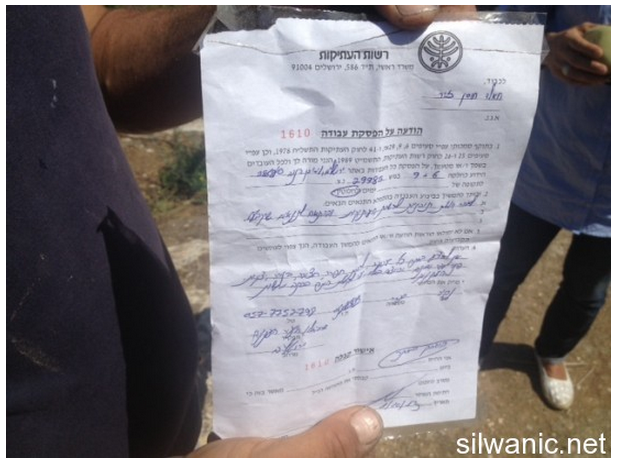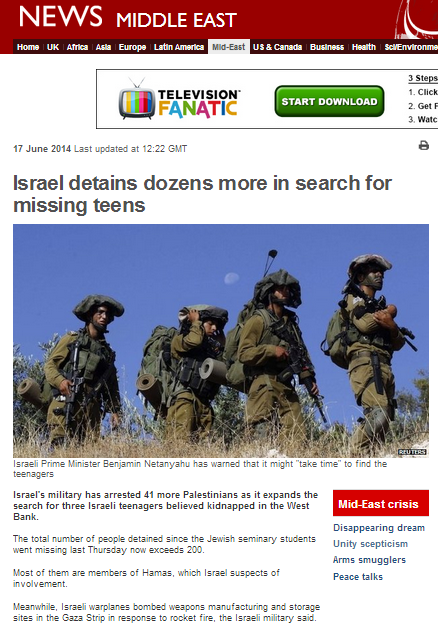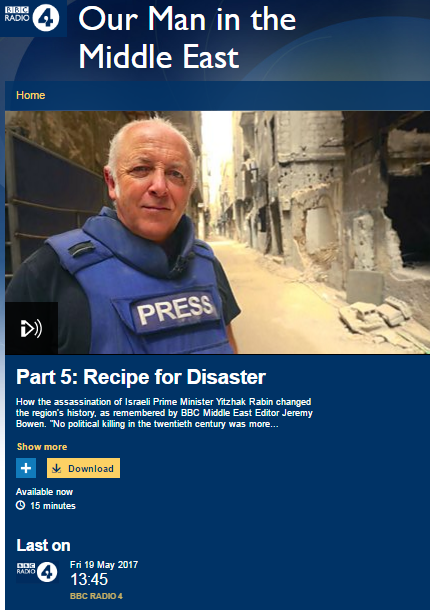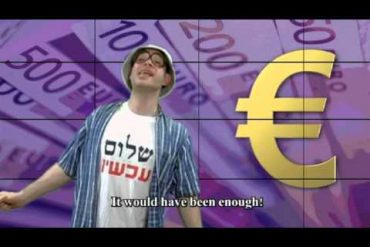The BBC World Service’s news and current affairs programme ‘Newshour’ began its coverage of the terror attack which had taken place at the Kehilat Ya’akov Synagogue in Har Nof, Jerusalem earlier in the day on November 18th in the afternoon version of the programme – available here from 00:45 to 12:50 and from 30:00 to 39:00.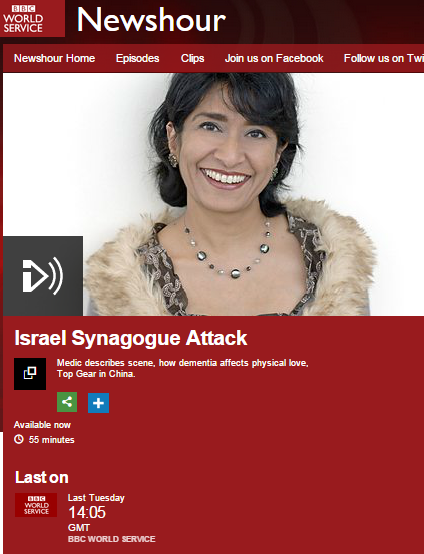
Presenter Razia Iqbal’s short introduction was followed by an eye-witness account from paramedic Akiva Pollak who was one of the first to arrive on the scene. Next came a recording of a statement by the Israeli Minister for Internal Security, Yitzhak Aharonovich, after which Iqbal told listeners:
“The synagogue attack comes a day after a Palestinian bus driver was found hanged in his vehicle in Jerusalem. Israel says this was a suicide but his family says he was murdered. Hamas said the attack was retaliation for the death of the bus driver.”
That was followed by a recording of Hamas spokesman Sami Abu Zuhri saying:
“The Hamas movement praises the attack in Jerusalem and considers it a normal reaction to the killing of Yusuf al Ramouni and repeated Israeli crimes at the Al Aqsa Mosque. Hamas confirms how important it is to avenge Israeli crimes.”
This of course was not the only occasion on November 18th upon which the BBC – despite the scientific evidence provided by senior pathologists – elected to amplify a dangerous narrative based entirely on evidence-free Palestinian incitement. That same propaganda was promoted on BBC television news and on the BBC News website – see here and here.
After informing listeners that Mahmoud Abbas had condemned the attack – adding “and also called for an end to what he called Israeli provocations” – Iqbal introduced the BBC Jerusalem Bureau’s Kevin Connolly who claimed that:
“..quite a lot of violent incidents in the past few weeks appear to have been the result of individuals acting alone with no planning and no preparation…”
Connolly did not inform listeners of the very relevant fact that many of those perpetrators belonged to assorted terrorist organisations or that some of the attacks were later claimed by such groups. Later on in the conversation, Connolly presented audiences with his menu of ‘contributing factors’ to the surge of terror and violence over the past few weeks.
“I mean we would say that washing around in the background of what is a palpable increase in tension in Israeli society are a couple of issues. There was the summer conflict in Gaza; there is continued Jewish settlement in an Arab district of East Jerusalem called Silwan.”
Yet again we see inaccurate BBC portrayal of the summer hostilities as having taken place exclusively in the Gaza Strip, along with another politically motivated presentation of the legal purchase of properties in a certain Jerusalem neighbourhood by people of a specific ethnic/religious group as “settlement”. Connolly goes on:
“But the key to all of this, we think, is this ancient dispute about rights of worship at the Al Aqsa Mosque – which is called Temple Mount by Jews of course. Now that is a site sacred to both faiths – to Muslims and to Jews. Muslims believe Mohammed ascended to heaven from that very point. Jews believe that it’s where their ancient Temple – destroyed by the Romans – stood; where the Holy of Holies of the Jewish faith is. Now by a very long tradition, only Muslims are allowed to pray at that site. Jews can go there but they may not pray. Now in recent years a Jewish religious movement has grown up arguing the right of prayer should be extended to Jews. Any attempt to tinker with the status quo is regarded as an incendiary issue – not just in Palestinian society but in the wider Arab and Muslim world – and I think it’s almost certainly that issue much more than the others which is fuelling, as I say, what is a very, very noticeable increase in tension, not just in Jerusalem but also in the occupied West Bank as well. So the atmosphere is changing here for the worse and of course you know the lesson of history here is that cycles of violence like this one are much easier to start than they are to stop. You know, Israel says it has no plans to change that status quo whatever religious Jews argue but that assurance is simply not believed in sections of Palestinian society.”
As has been noted here before, the status quo on Temple Mount actually relates to additional issues besides prayer rights for non-Muslims (Connolly failed to inform listeners that the site is also holy to Christians, who are not allowed to pray there either) and other changes have been made to aspects of the status quo over the years which have not been regarded as an “incendiary issue”. Interestingly, despite its being defined by Connolly as a “key” issue, at no point in its extensive coverage of the topic of Temple Mount has the BBC made any attempt to address the subject of why the egalitarian idea of equal prayer rights for members of all faiths at a site holy to three religions should produce such a violent reaction in the “Arab and Muslim world” or how that issue has been employed over the years as a catalyst by leaders with political interests, just as it is being used now.
Kevin Connolly did, however, respond appropriately in this item to Razia Iqbal’s following statement:
“And the attack at the synagogue has provoked extremist views on both sides and there have been calls for all sorts of reactions to it today. Has there been any reaction on the street?”
Connolly: “There have been small gatherings of people on the streets and I think I’d be cautious of the word extremist in terms of the reaction here. People here are very shocked by the scale and the nature of the violence. A lot of pictures are circulating here on social media of bloodstains on the floor of the synagogue, of bodies of the dead covered in prayer shawls, so there’s a real sense of shock here.”
Later on in the programme, listeners heard a recording of the US Secretary of State’s condemnation of the terror attack before Razia Iqbal introduced two interviewees from Jerusalem – presented as giving an Israeli and an Arab view of life in the city. However, in breach of BBC editorial guidelines on impartiality (as was also the case on the BBC News website’s live page of the same day), the Israeli interviewee – Daniel Seiderman – was presented only as “a lawyer” and not as a political activist with the NGOs ‘Ir Amim’ and ‘Terrestrial Jerusalem’, meaning that audiences were not able to place his contribution in its correct political context and to understand that they were actually hearing two views from the same school of thought rather than differing ones.
The evening version of the November 18th edition of ‘Newshour’ will be discussed in a later post.

